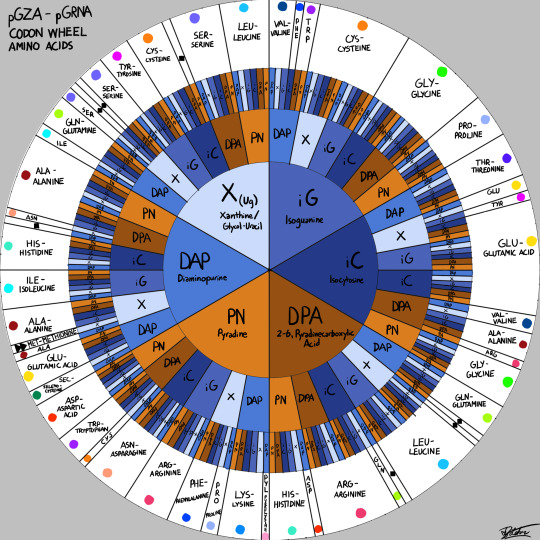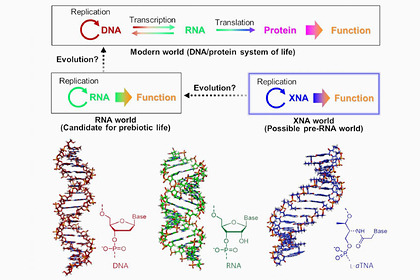#xenonucleic acid
Text

Codon Amino Acid chart for pGZA, the building block of life on Jom'Gol
pGZA is the abbreviation for Propylene-Glycol Nucleic Acid, which all cellular life on Jom'Gol uses. pGZA uses the sugar Propylene Glycol and a standard phosphate base.
Instead of Adenine, Thymine/(Uracil), Guanine, and Cytosine, pGZA instead uses Diaminopurine, Xanthine, Isoguanine, Isocytosine, 2-6, Pyradinedicarboxylic acid, and Pyradine.
Rather than (DNA):
A-T (Hydrogen Bond)
C-G (Hydrogen Bond)
pGZA uses:
DAP-X (Hydrogen Bond)
iC-iG (Hydrogen Bond)
PN-DPA (Copper ii ion Bond)
Each Codon combination in pGRNA production results in the production of one of 23 amino acids when read by the xenoribosome in any Jomgolian creature's cell, with the addition of one start codon and several stop codons.
#art#digital art#artists on tumblr#worldbuilding#speculative biology#speculative evolution#spec evo#spec bio#xenobiology#dna#jomgol#propylene glycol#xenonucleic acid
39 notes
·
View notes
Text
So obviously even if life arose on another planet that was chemically very similar to the primordial Earth it would not use the exact same biochemical arrangements. There are lots of simple sugars that could form genetic polymers, even ones with a helical structure, and lots of different possible nucleobases, and even the correspondence between codons and amino acids (including what amino acids life uses in the first place) are arbitrary. As long as everything is water soluble and the bonds aren’t so weak that big organic molecules fall apart nor so strong that you can’t take them apart to reuse (or get any kind of stochastic changes at all to drive Darwinian evolution), it’s mostly a question of what particular chemical combo your alien microbes happen to land on, with an assist from molecular geometry and stuff.
A lot of this has been played with experimentally—xenonucleic acids and unnatural nucleobases and such—but of course mostly with an eye to doing practical stuff like antisense therapies or studying the history of life on Earth. What I have a less good sense of is what kind of chemically-similar-but-totally-historically-distinct developments you could get in such a scenario. Could you have a genetic molecule based entirely on amino acids? Are there other organic macromolecules that could be efficient ways of storing genetic information? Is it absolutely necessary to have genetic information be totally distinct from proteins in the first place—could you have some kind of system where certain critical proteins built copies of themselves and other important functional proteins?
I don’t see an immediate reason why not, but I really don’t know enough about molecular biology to be confident in that assessment, much less what such structures would look like!
32 notes
·
View notes
Text
Progenitors of living organisms on Earth have been named
Progenitors of living organisms on Earth have been named
Scientists Nagoya University in Japan have shown that the precursors of living organisms on Earth could be molecules similar to DNA, but not RNA. This is reported in an article published in the journal Nature Communications. The scientific work is summarized in a press release on MedicalXpress.
The researchers believe there was a pre-RNA world based on xenonucleic acids (XNA) before the first…

View On WordPress
0 notes
Note
You know what is annoying... It feels wrong not to put science in a book if you're writing science-fiction. Like, how do you make up your own science? You would have to explain it IN TERMS OF REAL SCIENCE BECAUSE THAT'S WHAT PEOPLE KNOW or it's like, "I made up science to fit my narrative because I don't like to research anything." Like... This is a real delemia for me. Help.
Hi! Sorry I didn’t get to this sooner, I was in class.
I know this feeling very well. I have a science fiction novel myself, one that’s pretty much finished, so I can tell you what I’ve found.
The best fake science is based off of real science.
In my sci-fi novel The SOLE Project, my eccentric scientist character grows teenage human beings and gives them superpowers.This does not happen in the real world. Obviously.But science is progressing to the point where, if you have a bit of an imagination, it could. Between stem cell work and synthetic enzymes and silicon based lifeforms and an increasing understanding of how bodies work and how we can artificially replicate them, suddenly my premise seems… If not achievable, certainly within the realms of science fiction.
You’re allowed to be vague.
I don’t know very much about boundary-pushing science and new theories except for the cool articles I read on the internet. But if I take a few of these scientific buzzwords and throw them into my novel, it adds a little more science into “science fiction.” Observe:
“These are exceptional results, doctor,” Barbara’s familiar voice said. Beth couldn’t see her, but she could hear the smile that was on her face. It was one she wished to see every day of her life–it meant that the doctor was highly pleased. “Your idea to use xenonucleic acids was inspired.”
See what I mean? To the average reader, this is going to sound weird and science-y, and it is just vague enough where we can get away with it. What is XNA? What are they being used for? What were the results that they were talking about?
You might not need to figure out as much science as you think you do.
As writers, we tend to want to world build until we drop dead. And while worldbuilding is important, and fun, there comes a point where you need to stop and consider: is this science actually going to come into play in the narrative?
Let’s say your sci-fi world has hoverboards. You could try and research engineering until you know how hoverboards could be made, but unless there is a plot point that involves knowing how hoverboards work, why do you need to? You can tell your readers that there are hoverboards, and they will accept it without knowing how these hoverboards work. That’s one of the beauties of sci-fi. You only explain how hoverboards work if your character visits a mechanic, or if they have to hack into one. And if that doesn’t happen? You can avoid the explanation!
I hope this helped! If you ever want to send in another ask detailing more about your sci-fi world, or if you ever want to send in an ask about anything else, please feel free! Inbox is always open :)
#incandescently answered#vikki1018#science fiction#writing science fiction#scifi novel#the sole project#answered#asks#how to write sci-fi
24 notes
·
View notes